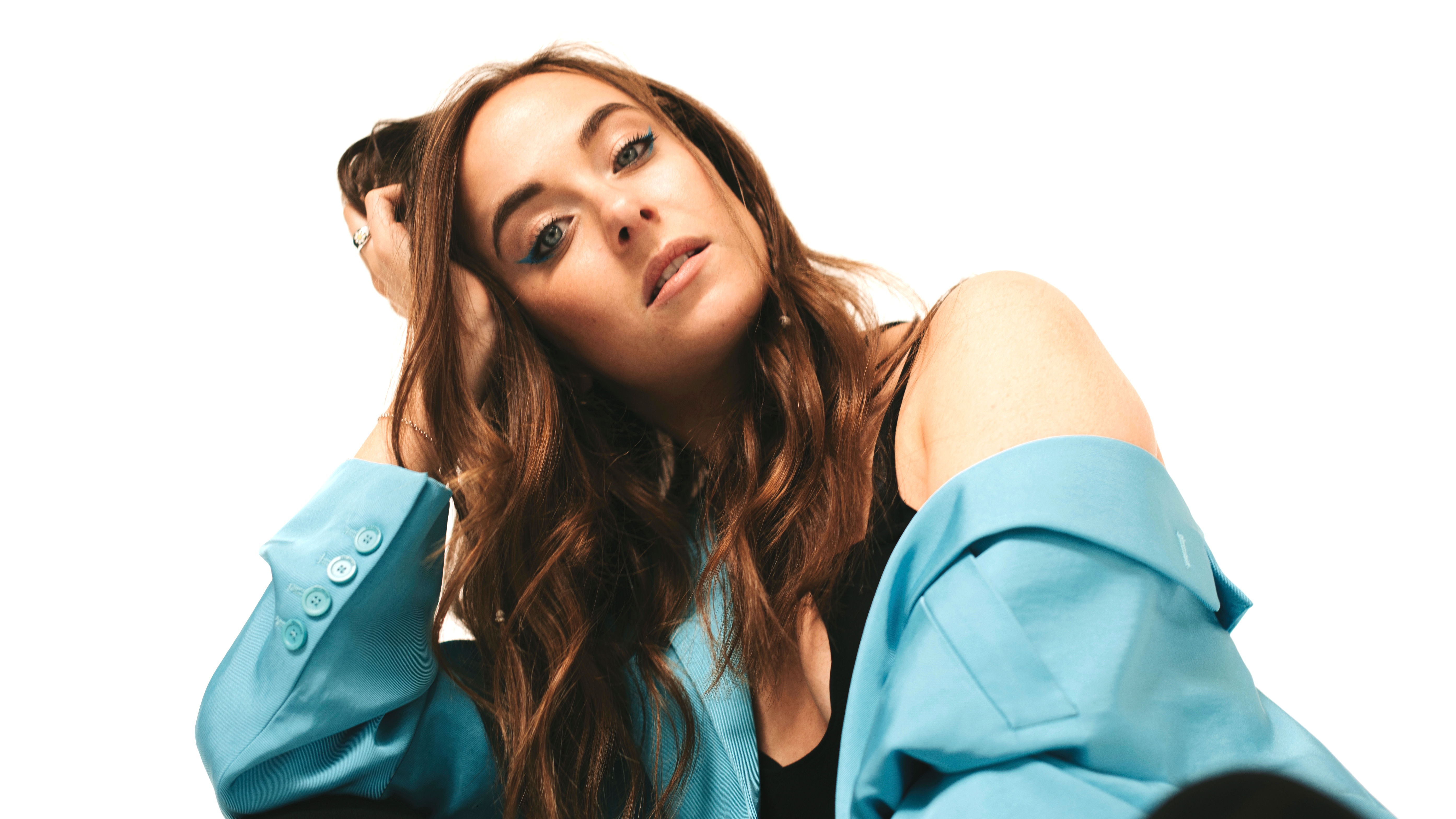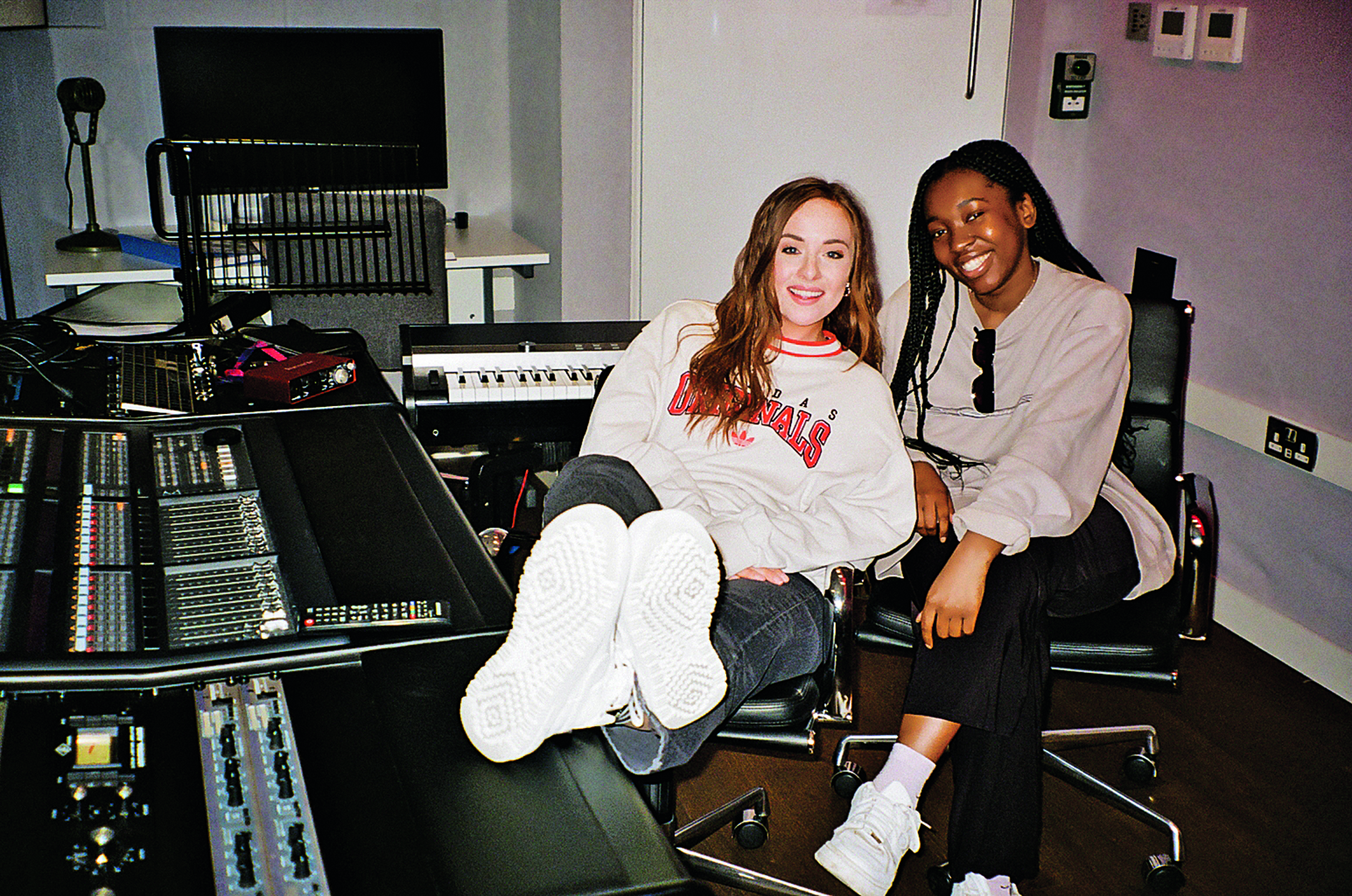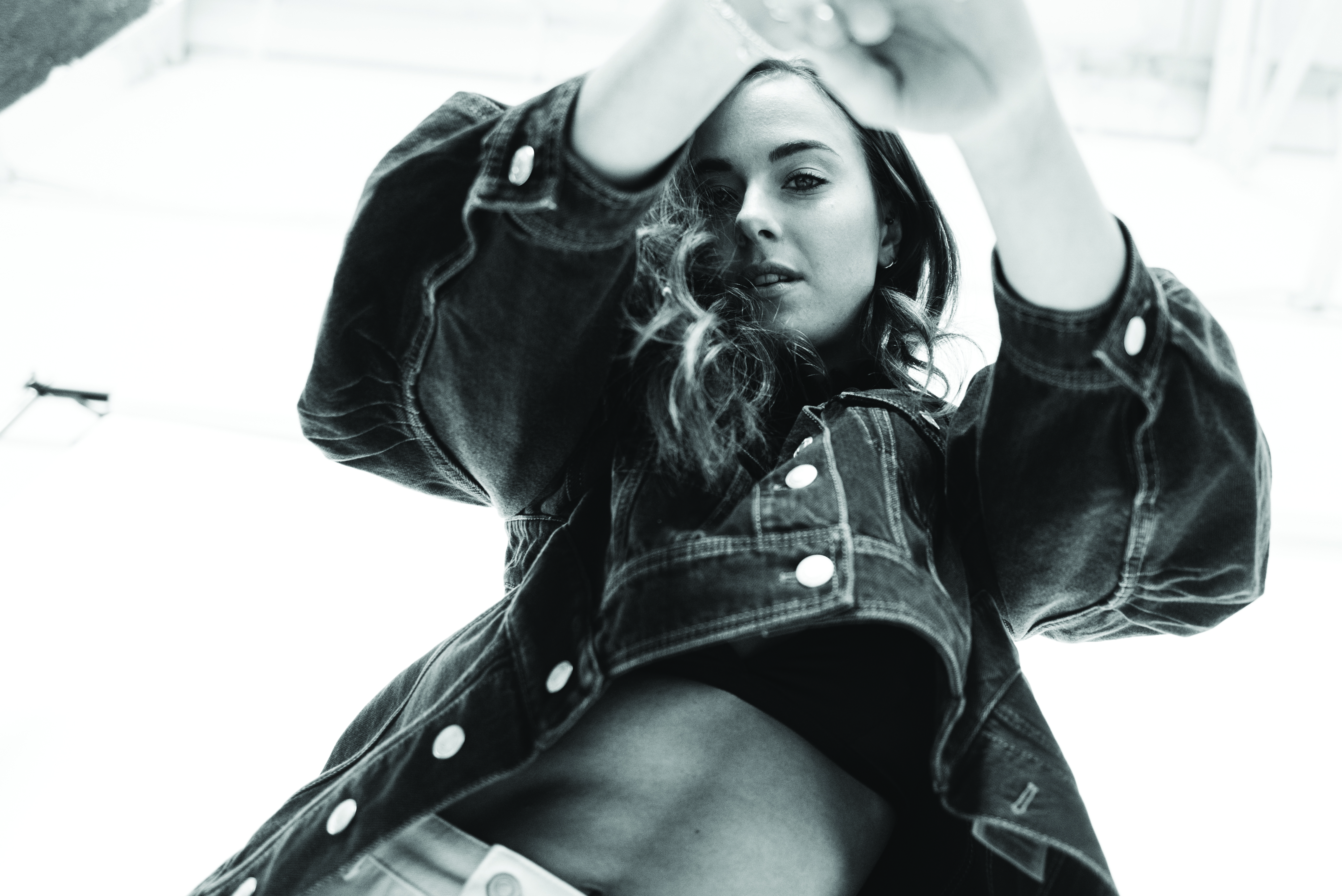AmyElle: "Don’t try to be anyone else. Push the boundaries and do it because you love it"
AmyElle’s house productions have racked up millions of streams and launched a DJ career that’s seen her play live at Amnesia, Tomorrowland and across the States

Want all the hottest music and gear news, reviews, deals, features and more, direct to your inbox? Sign up here.
You are now subscribed
Your newsletter sign-up was successful
Since she began producing music at LIPA while studying for a degree, Amy Elle made a firm promise to herself to make music that transcends any particular scene: when you’ve been exposed to a whole array of styles growing up, why pick just one?
Now she’s becoming almost as well known for her incendiary house productions as her DJ appearances that have taken her across the globe playing venues as far as the States and iconic festivals like Amnesia and Tomorrowland.
Most recently she’s played BBC Radio 1’s Big Weekend, with the radio station adding their support to a growing number of other outlets tipping AmyElle to be one of the dance stars of 2022.
How did you start out in music production in the first place?
“I’ve always loved music and grew up around a ton of different genres as my parents’ CD collection was stupidly big. There wasn’t a moment where music wasn’t blaring in our house, ha ha. I was lucky enough to learn classical guitar and piano and started singing and songwriting from about 12. I started singing and playing guitar in bars, at weddings etc and then studied a BA in music at LIPA. Here I found my love for dance music and production.”
When and how would you say you became successful, or at least able to make a living from music?
“It was a bit crazy because I started this project just before lockdown really, and I was lucky to have this time during it to focus purely on my music and not have a side job. I released my first few records in this time and I decided to be really active on social media and take advantage of connecting and building an audience this way.
“I used to stream pretty much every week on Twitch and the streams were really fun. I had the whole family dancing and it was just feel-good energy which I think everyone needed. I was one of the first DJs to start doing small mixes and tutorials on Reels and TikToks and the videos just blew up and I started gaining a following.
“After lockdown my first shows were with Elrow, at Fabric, Motion etc to 5,000+ people which was insane and pretty daunting. I was then able to go full-time in music which I’m super lucky for. Don’t get me wrong, it’s a hustle, but I feel so lucky to do what I love full-time. I’m so proud of how far I’ve come in a short amount of time, but there’s a long way to go still in order to get to where I want to be!”
Want all the hottest music and gear news, reviews, deals, features and more, direct to your inbox? Sign up here.
What is your musical philosophy?
“Don’t try to be anyone else. Push the boundaries and do it because you love it.”
When did you discover the computer music route to music production?
“I got into production when I was at uni and instead of writing just acoustic songs, I started to write music with [computer] production as well. I find different sounds and beats really inspire different vibes and melodies rather than just writing a track acoustically then producing it up. I do think there is something special about writing a song acoustically and at the end of the day, a great song is a great song. So I like to do both ways.”
Tell us about the gear in your studio.
“My three solid pieces of equipment in my studio are: Focal Alpha 65 speakers, a Universal Audio Apollo Twin X DUO Heritage Edition audio interface and a Shure SM7B Vocal Dynamic Microphone.”

What are your favourite plugins?
“I love all the Soundtoys plugins. EchoBoy I love as it has some really nice and experimental echoes (30 to be exact). It’s great to use on vocals and on synths and it’s modelled on vintage gear so straightaway it has a really nice authentic sound to it. Also getting perfectly timed delays is really easy as you just dial in a musical note value and type in the tempo of your record and you’re good to go.
“Kickstart 2 by Nicky Romero. It’s quick and easy to sidechain whilst on the go and producing. When I’m in the creative process, I focus on the writing rather than getting in the nitty gritty with my mix at that point. I can just whack this on and achieve a sidechain. You can see the kick drum and bass in one analyser which I love, and you can really glue your kick and bass together. It also has some other really cool features.
“FabFilter Pro-Q 3 is incredible. It’s expensive but so good for EQing and picking out extremely accurate frequencies. It’s easy to use and it’s really visible and can help you make more informed mixing decisions. It shows you a sound spectrum and the ‘not so nice’ frequencies clearly, meaning you can really get surgical and remove exact frequencies that are sometimes hard to find by ear.
“Diva by u-he. It sounds so good; a software synth that sounds so analogue. It resembles so many classic instruments and the interface is super simple to use. There’s a lot of flexibility on the sound design and did I mention it sounds
so good!?
“Arturia V Collection. I would recommend this collection to any producer wanting to get into buying soft synths. It has some great ones that replicate the original hardware and they all sound so damn good. They are all in one place, firstly saving you a considerable amount of money and pretty much my go-to for synths.”
How do you tend to start a track?
“It all depends, but usually I write my best stuff when I don’t have an expectation for a track and I just write what I’m feeling. If I’m writing more of an underground track I’ll start by getting a groove going and I work quickly, just chucking loads of ideas in. I’ll then typically work on a bassline and more of the melodic elements. I then tidy up the project and pick one route to go down and lay out a rough structure. I’ll then add the hooks in, then go back to the production and finish it off.
“If I’m writing more of a song with vocals then I love to get a vibe, but focus mainly on the topline and then go back and produce around it. Sometimes the vibe changes completely as I feel like it’s easy to go down a rabbit hole with music production, especially when you should be focusing on the topline and then decide what the best vibe for the song is.”

Do you have any production tricks?
“I’m always finding little tricks and still finding more, but with my EP Push It, I wanted it to have a nice older classic house feel to it. I didn’t have any hardware synths either, and sometimes software synths sound too digital so one trick I use is to add some tape hiss or a bit of vinyl crackle and I find you can then pretty much replicate the nice older hardware synth sound.”
How do you know when a track is done?
“I think you can always keep working on a track. Sometimes you just need to be strict with yourself because the longer you sit on a track, I find that’s when problems occur. I’ve ended up changing things so much on a record (and not for the better), or I get bored and end up scrapping the idea because I’ve spent too long on it.
“I’m still learning how to work quickly, but my advice would be to get a track to a standard you are pretty happy with (solid demo). Then spend a day tidying it up, going through and changing samples and sounds (if needed) and taking out unnecessary sounds. Less is more. Come back to it with fresh ears then spend another day/couple of hours to finish it off. Sometimes it takes a bit longer but set deadlines and be strict with yourself.”
What’s on your gear wishlist?
“Most of my production is done in the box, and I’m not afraid to say that! Although I would love to get my hands on a Sequential Prophet Rev2-08 eight-voice analogue synth and the Arturia MatrixBrute! The list is endless though…”
Which track do you wish you’d produced and why?
“Growing up from a classical background I’ve got to say Time by Hans Zimmer is just an insane track. I get goose bumps every time I listen to it. It’s so simple, it builds and creates so much tension and emotion. What more could you want?”
Any advice for playing live?
“1. Know your tunes and be prepared. I always have a little folder of records that I want to play and what I think I’m going to play to start off my sets. Sometimes, however, the crowd or vibe isn’t what you expect and the tunes that you have picked aren’t quite right so it’s important to venture into your record collection fast. So if you’re well prepped, know your record collection, know where things are placed, then you can spend less time stressing and more time connecting with your audience and finding the right tracks.
“2. Engage with your audience. When people see me DJ I want it to be a performance. At my first few shows I was too wrapped up in my mixing and I didn’t spend enough time connecting with people in the crowd and also having fun with them. I want people who are coming to my shows to feel special and involved!
“3. Check your decks before you play! Too many times I’ve got to the decks, started playing and then freak out when something is wrong on the decks and in turn, I mess up because the setting isn’t right. Don’t rush getting started.”
What about studio advice? And do you have any other advice from the industry that you can pass on?
“Less is more. Be focused and finish records, even if you’re not 100% on them. Every record you do you learn from, and it’s better to have ten finished records and out of that bunch you may only end up with one that you love and maybe one you want to pitch to someone else. It’s better than having nine half-finished records and one finished one but wondering ‘could the other vibes be better?’… if that makes sense. I feel like records come together in the final stages of production so persist through and learn from them.
“[In terms of advice from the industry…] the music industry is a small place. Treat others how you would want to be treated. Be kind, connect with others and support others.”
What would you like to see developed in terms of music production technology or studio gear?
“Wow really hard question. You’ll need to come back to me because I’m sure I’ll figure out a ton of things that I would like but firstly: computers with less noisy fans! I also think nowadays loads of plugins can’t cope with software upgrades which is an absolute pain for some that in time are no longer usable.”
What do you have planned?
“Let Me In is out, with an amazing up and coming artist called Shania who brought a really nice ethereal side to the record. I wanted to make a club track with a teasing melodic element. I produced the backing track and sent it to a couple of artists to put a hook on it because I wasn’t too sure what would suit it. First off I thought it needed a strong soulful vocal, but Shania added this really soft airy, emotional topline which I really loved and thought complemented how heavy the backing track was.
“I was road-testing it in places like Fabric and Printworks before the release and it went off so I knew I wanted to release it. The record got some great playlist support from Spotify and Shania and I made the cover of UK House Music which is super great. Sarah Story made it her track ID on Radio 1 and I’ve got some great feedback from DJs who I love and respect so I’m pretty happy with that.
“Touring-wise, I’m playing a ton of shows this summer like Amnesia, Tomorrowland, Hideout and Firefly. It’s so exciting. I feel so damn lucky. I’m writing a ton of music too, which I’m really happy with. I have some super interesting collaborations and I can’t wait to share it. I’m also writing a lot of music for other people and I’m also really wanting to start singing again so getting my vocals featured on other tracks and my own is the next step.”


Computer Music magazine is the world’s best selling publication dedicated solely to making great music with your Mac or PC computer. Each issue it brings its lucky readers the best in cutting-edge tutorials, need-to-know, expert software reviews and even all the tools you actually need to make great music today, courtesy of our legendary CM Plugin Suite.
